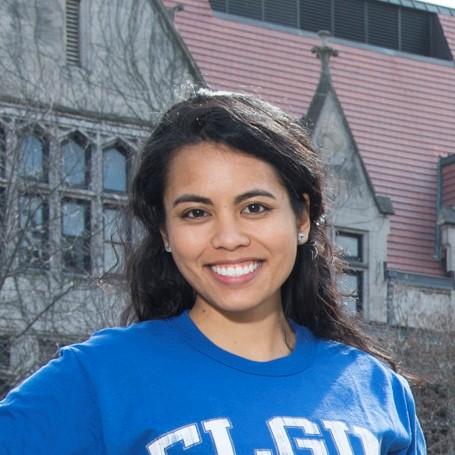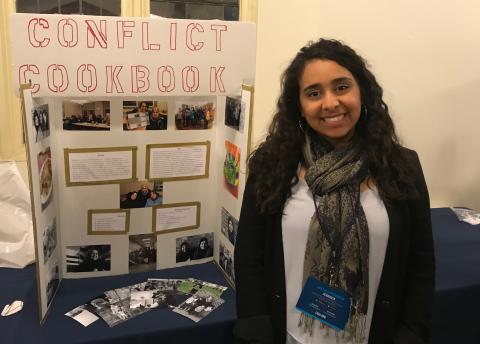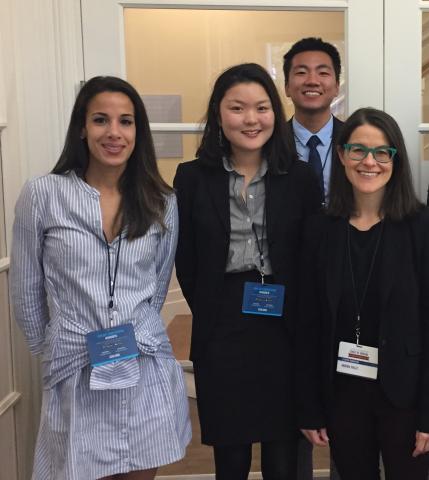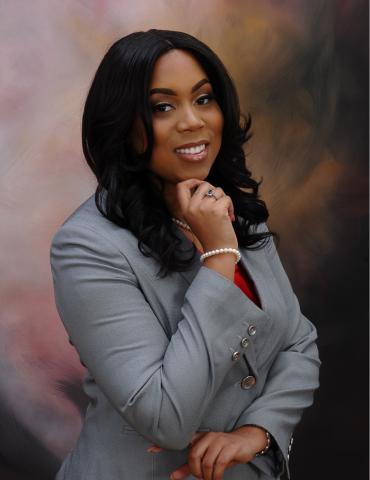Law School Students Hone Social Impact Projects at Clinton Global Initiative University
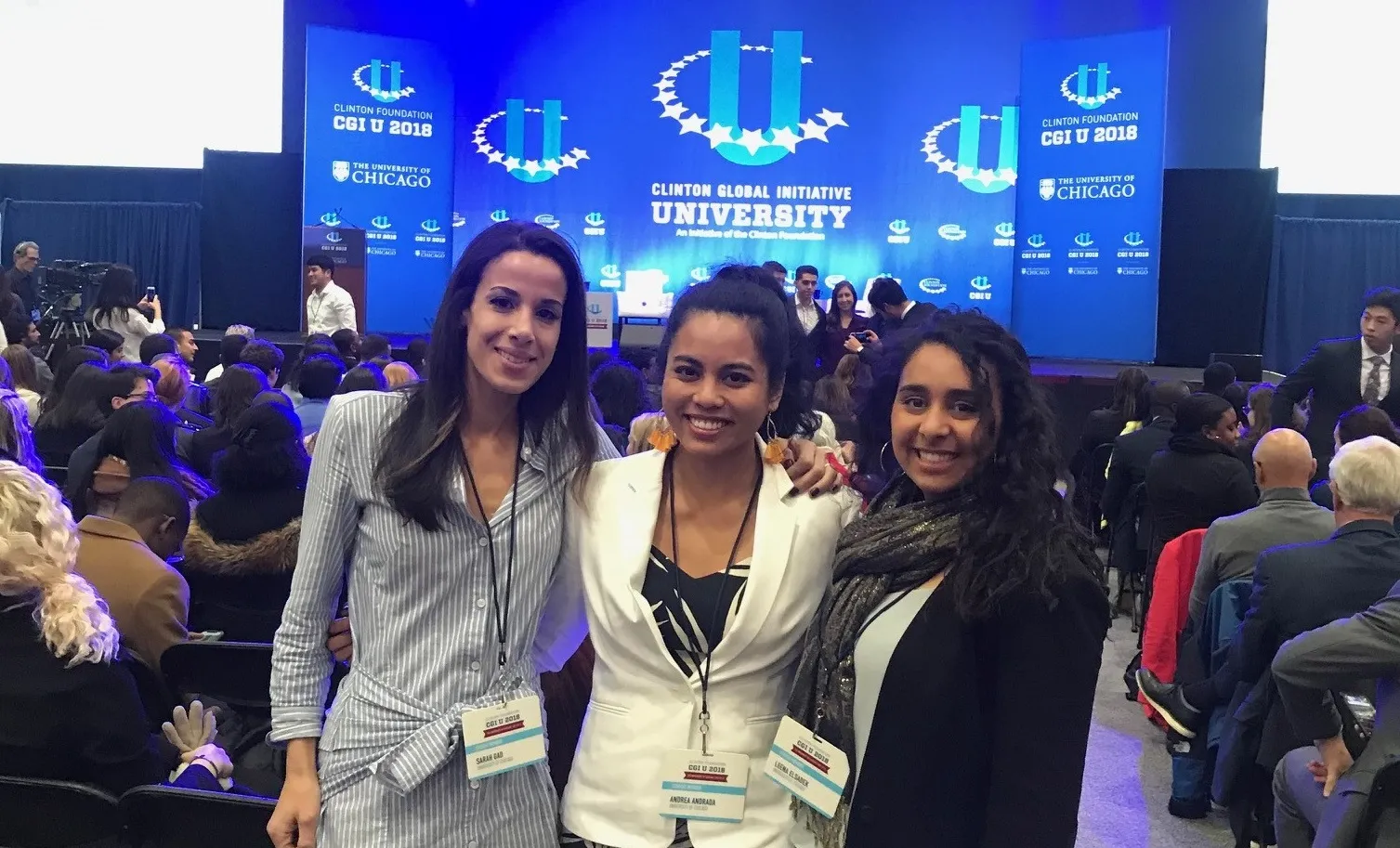
Law School students who are developing ventures aimed at solving pressing societal challenges were among more than 1,000 participants in the Clinton Foundation’s 11th annual Clinton Global Initiative University, which was held at the University of Chicago this year. The three-day event, which ran earlier this month, featured talks by former Secretary of State Hillary Clinton, former President Bill Clinton, and Chelsea Clinton.
Seven Law School students participated in the meeting, which included working sessions, special events, and a day of community service. Among them were Leena El-Sadek, ’20, whose project aims to empower refugee women; Sarah Gad, ’20, who seeks to expand access to medication-assisted treatment for prison inmates with opioid-use disorder; Ray Andrada, ’19, who is working to create on online platform that would allow undocumented immigrants to share resources safely and securely; and Subria Whitaker, ’20, whose seminar and mentorship program aims to improve career- and college-readiness among Chicago Public School students.
“I had the opportunity to present my commitment while I was at CGI U, and I was surprised at the number of people who knew someone or some organization that could help,” El-Sadek said. “I’ve had this idea for a while … but I was never able to actualize it. After just two days at CGI U, I received 12 business cards and emails from web developers to potential funding partners eager to help me get [my project] off the ground.”
Law School students have a strong history of entrepreneurship and social impact projects, building their skills and contacts through the Doctoroff Business Leadership Program; clinical offerings like the Innovation Clinic and the Institute for Justice Clinic on Entrepreneurship; public interest and pro bono work; and even classes like Coding in the Law. In recent years, Law School students have placed among the top finishers in the John Edwardson, ’72, Social New Venture Challenge (SNVC), a campus-wide competition organized by the Rustandy Center in partnership with the Polsky Center.
Below, four of the Law School students who participated in CGI U share a bit about the experience—as well as the project they are working to develop. (To read more about the CGI University across campus, read coverage by the University of Chicago’s News Office.)
Andrea (Ray) Andrada, ’19
Project: SOMOS, a secure online community that allows undocumented immigrants to share experiences and resources freely, anonymously, and without fear of exposure. [Andrada is working on the project Kendall Burns, ’19; Serafina Ha, SSA ’19; Evelyn Morfin, MBA ’19; Hayder Allebban, MBA ’20; Lawrence Tsai, MBA ’20.]
What I gained from CGI University: CGI U affirmed and helped me better envision the type of multi-faceted attorney I aspire to become. The University of Chicago is a great place to find individuals who plan to make contributions toward a better future in a variety of ways, and CGI U was a special extension of the privilege to collaborate with and receive support from change-makers around the world. One of the learning-related strengths of our law school is its smaller size, but the way that CGI U can bring together more people from a greater diversity of ages, interests, and backgrounds served as a valuable opportunity to step back and take a higher perspective of how our field fits into a much more complex, cross-sector, and global picture.
Most inspiring moment: At the closing plenary, former President Bill Clinton shared some advice to the effect that we should not allow ourselves be broken by disappointments that arise in the course of our lives. Next to him, nodding in agreement, was his wife, Secretary Hillary Clinton, a woman who remains committed to championing issues despite her share of disappointments. President Clinton's comments prompted me to reflect on my own life and assess possible ways in which I may have allowed disappointments to affect my optimism or goals over the years. I was inspired to remain vigilant and self aware so that, using words of Nelson Mandela, my future decisions will reflect my hopes and not my fears.
Why our project is important: The name SOMOS draws inspiration from the Spanish word meaning "we are," which alludes to (1) the sense of togetherness our online platform seeks to generate for undocumented immigrants who are managing feelings of isolation and (2) the assertion that we are united by our humanity, regardless of immigration status. Led by one of our team members who was an undocumented immigrant for 16 years, we interviewed nearly 100 undocumented immigrants from across the country before endeavoring to create an online community for undocumented immigrants to connect with one another, find resources, and try to help ease the burden that feelings of isolation and secrecy can impart. We have partnered with five immigrant-serving nonprofit organizations who will be tasked with individually inviting members onto our platform. We also have several additional volunteers whose capacities include code development, user-experience design, branding, legal research, and fundraising. Our cybersecurity experts are actively vetting the most secure locations for hosting our servers and enlisting the help of some of the most knowledgeable technology partners in the field.
Leena El-Sadek, ’20
Project: In 2013, while an undergraduate at Duke, I created and directed a refugee organization in Durham, North Carolina, called SuWA: Supporting Women’s Action. SuWA is a student-organized community effort working to empower refugee women in North Carolina through education, small business development, and community building.
My CGI U project, Conflict Cookbook, was inspired by the many hours spent with SuWA women in classrooms and in kitchens. Conflict Cookbook aims to empower refugee women by privileging their voices. The story cookbook, both an online and print edition, will contextualize the women’s recipes by placing them alongside stories the women wish to share from their home country. These story-recipes will help bridge the gap of understanding between Americans and majority Muslim, conflict-torn countries. Conflict Cookbook will also financially and socially empower refugee women by helping them generate income, language, and business skills. Conflict Cookbook’s vision is to help facilitate relationships and reduce and eliminate stereotypes between America and Muslim women through a unanimously appreciated vehicle of communality and happiness—food.
What I gained from CGI University: I left CGI U with two pivotal takeaways. First, the network and community you gain is deep and rich. I had the opportunity to present my commitment while I was at CGI U, and I was surprised at the number of people who knew someone or some organization that could help. I’ve had this idea for a while (since SuWA), but I was never able to actualize it. After just 2 days at CGI U, I received 12 business cards and emails from web developers to potential funding partners eager to help me get Conflict Cookbook off the ground. Second, the energy at CGI U is incomparable. With more than 1,000 other projects, I left CGI U with a renewed sense of optimism that, hey, maybe this is possible. While participants came from all the world, we all shared a unified goal of moving our world forward to more a just, equitable reality. I hope CGI U’s flame of inspiration and hope never wavers.
Most inspiring moment: When Jacob Tobia—LGBTQ+ rights activist, writer, and overall phenom—told us: “There’s something radical about a marginalized person saying, hey, my story matters, and you need to hear it.” Since we were both Duke undergraduates, I’ve always been moved and inspired by Jacob. In a panel discussion about elevating narratives, he very authentically described his journey as an advocate and the multiple challenges he experienced along the way. In our highly digitized world, I’ve always been concerned about reducing narratives into Internet-friendly sound bites. Is it catchy enough? Shared enough? Creative enough? Jacob frankly reminded me that it’s not the narratives that need changing—it’s the people. So when we’re telling stories, especially of those who have been constantly denigrated and neglected, we should focus on elevating and amplifying them. He reminded me that we reach people through authenticity, and we should keep pushing this authenticity until it gets heard. Jacob left me with this, and I have since been thinking about it often: “If you’re angry, stay angry. But make sure you share your anger because you never know who’s listening and committed to joining you on your fight.”
Why my project is important: British-Somali poet powerfully wrote: “No one leaves unless home is the mouth of a shark.” For over 50 million displaced people, worldwide, home has become the mouth of a shark. Home has become violence, hopelessness, and death. Home has become only a memory.
The refugee situation is unfathomable to me, as I am sure it’s unfathomable to many. Unfortunately, the number of displaced people is not decreasing and policies around the world are making it harder for refugees to relocate. For the 2 percent of refugees that are able to resettle, they are greeted with discrimination, lack of employment, and unaddressed psychological trauma.
Conflict Cookbook provides women space to share their stories, recipes, skills, and potential with a larger audience post-resettlement. It empowers women from conflict-torn areas by affording them the opportunity to generate income, language, business skills, and new relationships. More importantly, Conflict Cookbook attempts to highlight the dire refugee situation and spur people into action by allowing refugee women themselves to shape their narrative.
Sarah Gad, ’20
Project: My project, A2A (Addiction to Action), involves expanding access to medication-assisted treatment (MAT) to inmates with opioid-use disorder (OUD) within the Pennsylvania Department of Corrections. My project aims to foster collaboration between the correctional facilities and area healthcare professionals to expand access to MAT to individuals with OUD within the jail, and ensure continuity of treatment post-release. In addition, the proposal is aimed at facilitating reentry by working with external partners (e.g. the Philly Reentry Project and local companies and nonprofits) to create job opportunities and expanding access to education in order to assist inmates with re-integrating into society in a productive and meaningful way. The goals are to promote sustained sobriety and successful reentry into society, thereby reducing the risk of post-release overdose and relapse, and recidivism.
What I gained from CGI University: I came to CGI U with an idea, and left with the tools, resources, and connections that will enable me to implement my idea and take it to the next level. The workshops and plenary sessions helped to illuminate the skills and resources necessary to effectively carry out my commitment, identify potential challenges as well as how to address and overcome those challenges, and the partnerships and connections created channels for funding that will allow me to effectively carry out my commitment in PA, and hopefully expand it to correctional facilities in other cities as well. One of the highlights of my CGI U experiences was being invited to participate in the opioid advisory panel. The panel was composed of five other students dedicated to battling the opioid epidemic and allowed for collaboration and exploration of other ideas and ways in which we might work together to support one another’s projects to allow for a more comprehensive approach to addressing the very complex issue of opioid addiction.
Most inspiring moment: Listening to the stories of D’Angelo McDade, Sarah Chadwick, Muzoon Almellehan, three young passionate change-makers, all under the age of 18, who overcame tremendous adversity and risked their lives to fight for human rights, freedoms, and equality.
Why my project is important: Drug overdose is the leading cause of accidental death in the United States, with opioid addiction driving this epidemic. In the past decade, fatal opioid overdoses in the United States have skyrocketed, and the risk of fatal overdose is 129x greater during the initial weeks following incarceration. Access to MAT during this period decreases the risk of death by 75 percent. As a recovering opiate addict myself who has lost several friends to overdoses, three of which occurred within one week following their release from jail, the urgency of this issue is incontrovertible. Expanding access to MAT to inmates will not only prevent fatal overdoses upon release, but will ultimately reduce rates of relapse and recidivism. The second part of my project is aimed at reentry; creating job opportunities and expanding access to education is essential to sustained sobriety because it reduces the stigma and disenfranchisement that is often what drives those with OUD back to using, and will ultimately allow them to reintegrate back into society in a productive and meaningful way.
Subria Whitaker, ’20
Project: College and Career Readiness 101, a community-based seminar and mentorship program that aims to increase the number of Chicago Public School (CPS) students that matriculate into two- to four-year colleges or universities, enroll in trade programs, or enter the workforce after leaving CPS.
What I gained from CGI University: Much needed mentorship, fellowship, motivation to continue the work that I do both inside and outside of the Law School, and a reminder of my purpose in the Chicagoland area as a community servant.
Most inspiring moment: The most inspiring moment of CGIU was the panel during the Opening Plenary: Expanding Civic Engagement. Listening to the story and advice of D'Angelo McDade, a student who graduated from a Chicago high school like myself, was extremely motivating for me. We had the opportunity to connect after the panel, and I look forward to working with him in the near future.
Why our project is important: My project is important because it aims to increase the number of CPS students that matriculate into two- to four-year colleges or universities, enroll in trade programs, or enter the workforce after leaving CPS. My commitment also includes is a proposal to amend 105 ILCS 302/ College and Career Success for All Students Act by broadening the terms of educational success and including career and technical education programming. These changes will increase the success of Illinois public high school students, by strengthening the competitiveness of college and job applications with hands on experience, and aiding students in exploring all post-graduate options—including possible college majors, trades, career fields and overall interests.
